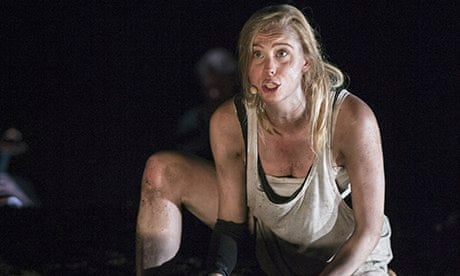Frank, the teenage psychopathic killer at the heart of Iain Banks's cult novel The Wasp Factory, is a study in depravity. He tortures and destroys insects and animals with the same imaginative efficiency he uses to murder his friend, his brother and a cousin. Left without a mother and rejected by his father, Frank's hatred is incandescent – but his hurt burns even brighter.
Ben Frost, the Australian electro-acoustic composer, has crafted a very personal response to The Wasp Factory in a new, 85-minute opera, first seen at this year's Bregenz festival. As in the book, Frank is the narrator, but Frost has him represented by three female singers, a device that not only enhances the musical possibilities but also vividly displays Frank's descent into insanity: there are always other voices in his head.
Frost, who also directs, makes huge physical demands on his three singers – Lieselot De Wilde, Mariam Wallentin and Jördis Richter. In Mirella Weingarten's startling design, they inhabit a raised platform covered with vast quantities of earth, in which they are made to writhe and scamper. As they warm to the theme of "their" murders, the platform begins to tilt, its angle increasing to near vertical as Frank becomes more unhinged. They slide and slither as the earth cascades on to the stage, clinging as though to a rock face, safety harnesses at the ready.
It's quite a spectacle: shame, then, that Frost doesn't provide vocal music to match. All the imaginative writing is given to a string quintet (drawn from the Reykjavik Sinfonia), while the sopranos are left to sing some undistinguished chant-like melodies that, while they serve to emphasise the ritualistic nature of Frank's appalling existence, aren't sufficiently interesting to convey adequately David Pountney's searing libretto.

Comments (…)
Sign in or create your Guardian account to join the discussion